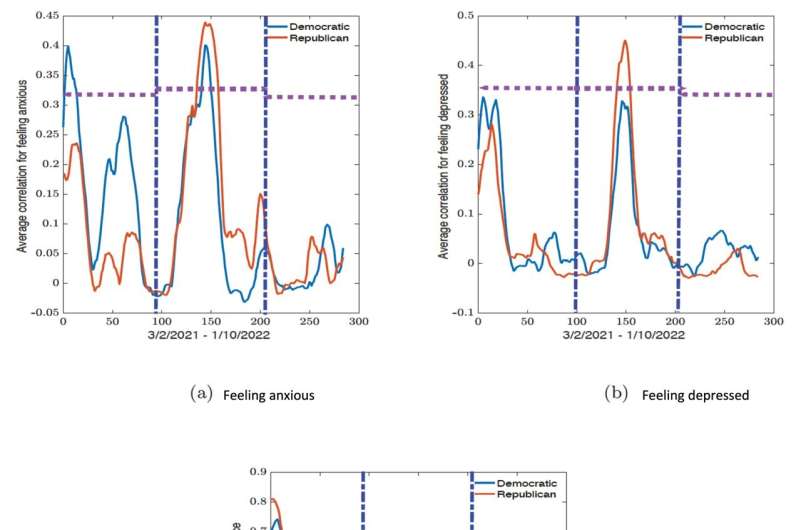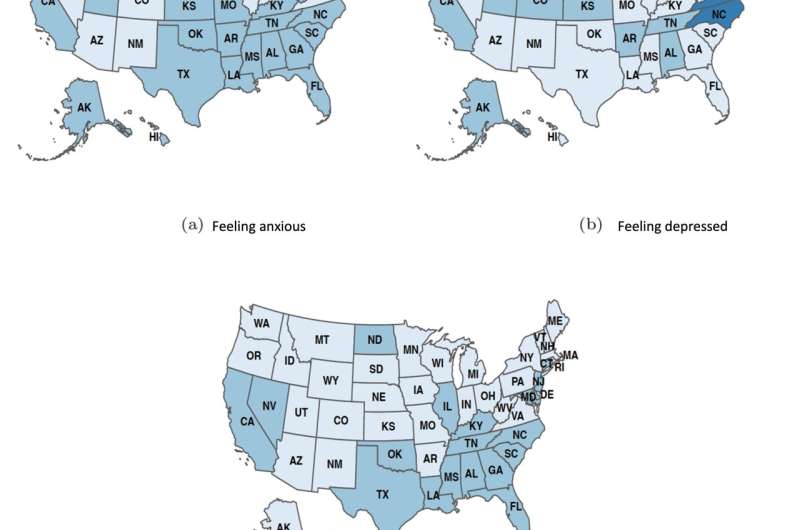This article has been reviewed according to Science X's editorial process and policies. Editors have highlighted the following attributes while ensuring the content's credibility:
fact-checked
peer-reviewed publication
trusted source
proofread
Study shows regional differences with COVID-19 mental health impact

A new study appearing in the peer-reviewed journal PLOS ONE shows how federal and state lockdowns and health mandates implemented to curb the spread of COVID-19 affected the mental health of people living in four U.S. geographic regions and affiliated with two major political parties.
A group of faculty, staff and student researchers at the University of Kansas generated data-based maps to look for spatial trends and communities with similar mental health and COVID-19 outcomes. Among the key findings:
- During the first wave, the Midwest and Northeast showed the highest average correlation for feeling anxious and feeling depressed.
- In the beginning of first wave, people in the Southern states had the highest correlation values for worry about finances.
- During the second wave, Southern states consistently showed the highest average correlation values for feeling anxious, feeling depressed and worried about finances.
- In the first wave, Democratic-leaning states had the highest average correlation for feeling anxious and feeling depressed. But during the second wave, Republican-leaning states had the highest average correlation values for feeling anxious, depressed and worried about finances.
"We focused on three variables to represent mental health outcomes in the U.S.—worries about finances, feelings of anxiety and feelings of depression—and we studied how this changed throughout the pandemic," said lead author Hiroko Kobayashi, a KU undergraduate student in psychology. "From the data, we saw more people feeling anxious and depressed with the emergence of a new COVID-19 variant—delta at the time— and that this increase was most prominent in Southern and Republican states. In addition, many of the Southern states showed similar changes in the percentage of people feeling anxious or worried about finances between March 2021 and January 2022."
Kobayashi and fellow KU undergraduate student Raul Saenz-Escarcega, along with research assistant Alexander Fulk, performed the investigation under the mentorship of co-author Folashade Agusto, associate professor of ecology & evolutionary biology.
"At the beginning of the pandemic, different mitigation efforts were put in place, efforts such as social distancing, school and event closings, and travel bans; infected individuals and suspected cases were quarantined or advised to self-isolate," Agusto said. "Some of these measures may have far-reaching impact on people's mental health and that of the general population. Prevalence of symptoms of anxiety disorder rose while depressive symptoms also increased. Given the importance of mental health, we used data indicative of mental health and mapped out similarities between the states regarding these mental health indicators."

The KU group relied upon survey data from the Delphi Group at Carnegie Mellon University, performing a study of clustering algorithms and the dynamic "connectome"—a term to describe overall connectivity of a network—obtained from sliding window analysis.
The team said the lack of a sweeping federal COVID-19 policy is reflected in their data by the emergence of regional differences in how severely people experienced the mental health toll of the pandemic.
"We discovered that the lack of national government intervention played a critical role in how well the general population responded to the increase in COVID-19 incidences," Saenz-Escarcega said. "The United States' decision to opt for individual state policies led to conflicting information from several state policies, and mismanagement of vaccines rolled out, leading to the rise of COVID-19 incidence report, which coincided with an association of increased feelings of anxiety. Although there was government intervention in the form of economic relief programs to curb financial worries, coverage of the delta variant emerging saw a positive association of anxiety across the states."
These regional differences might have been experienced in myriad ways within people's community interactions and personal lives.
"According to the Centers for Disease Control and Prevention, an individual's mental health encompasses their emotional, psychological and social well-being," Agusto said. "Mental health affects an individual's ability to make healthy choices, handle stress, and even their interpersonal relationship with others."
More information: PLOS ONE (2023). journals.plos.org/plosone/arti … journal.pone.0286857



















